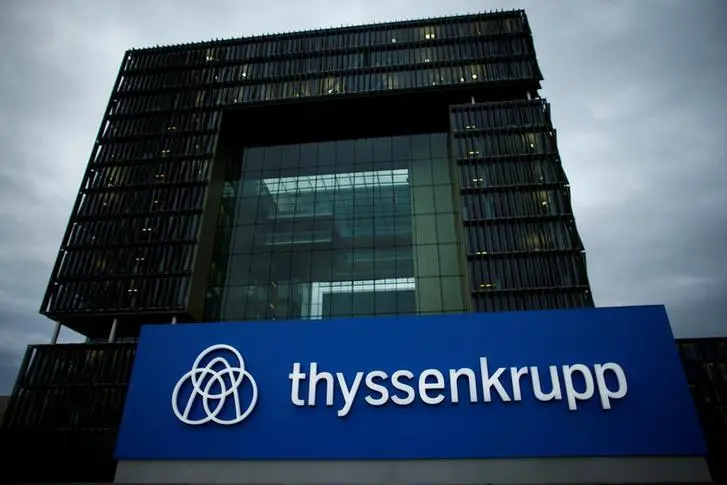PHOTO
FRANKFURT/DUESSELDORF - Thyssenkrupp may need to hand over cash or keep hold of some pension liabilities to win over Czech billionaire Daniel Kretinsky as a co-owner of its steel business, two people familiar with the matter said.
Thyssenkrupp has been in talks with Kretinsky's EPH, the energy division of his investment empire, on a 50:50 joint venture (JV) to finally rid the German industrial conglomerate of a business that dates back more than 200 years and has become tied to Germany's economic identity.
For the past decade, efforts to merge the division with, or sell it to, a rival, list it or spin it off have all failed.
Kretinsky remains the last serious contender in Thyssenkrupp's latest divestment efforts, giving him an advantage in ongoing talks with regard to timing and conditions, the people said.
The company wants a deal partly because of the challenging prospects facing the steel industry, including cost inflation, Asian competition, as well as the capital intensive nature of the business.
Thyssenkrupp Steel Europe has made operating losses in four of the past five years, but at 3.2 billion euros ($3.5 billion), or 39% of total group investments, it swallowed most of its parent's capital expenditure.
"It hinges on a financial commitment," a person familiar with the discussions said, adding that unless Thyssenkrupp injects cash Thyssenkrupp Steel Europe could have a negative equity value, meaning its liabilities would be bigger than its assets. The people did not quantify any potential financial contribution.
Part of the problem is 2.6 billion euros in steel-related pension liabilities, which Jens Muenstermann, senior investment analyst at LBBW, reckons are a hurdle in talks with EPH.
The pension liabilities, which relate to the steel business pension scheme, have also played a role in why past efforts to divest the business, including a planned JV with the European unit of India's Tata Steel, have failed.
Thyssenkrupp's net financial assets are 4.3 billion euros, but bolstering steel's balance sheet would still be a stretch given the company's other capital-intensive divisions, the people said, including submarines and car parts.
Another problem is Germany's budget crisis, the result of a landmark court ruling in November, which could threaten future investments in hydrogen fuel, a key element in efforts to cut CO2 in steel production, a separate source said.
"Kretinsky is in no hurry to do a deal," this person said, noting, however, the strategic rationale behind a tie-up, in which EPH would provide Thyssenkrupp with green electricity to help the steelmaker decarbonise production.
That relies on Kretinsky's plan to invest around 10 billion euros to turn EPH's German lignite activities, which it acquired from Vattenfall in 2016, into a group based on renewables, batteries and hydrogen-ready power plants.
EPH has said this will rid it of almost all its coal assets by 2025 and completely phase out the polluting energy source by 2030, green merits Thyssenkrupp CEO Miguel Lopez also highlighted last month.
Negotiations are also focusing on whether all of Thyssenkrupp's roughly 11 million tonnes of annual steelmaking capacity will still be needed in a potential joint-venture structure, the people said.
Meantime, there are doubts, too, over whether Kretinsky is the best partner for Thyssenkrupp.
"Thyssenkrupp should not sell steel for the sake of selling it," said Christian Obst of brokerage Baader Bank. He said that to his knowledge Kretinsky had no recognisable track record in steel. "Nor does he have any extensive expertise in the field of renewable energy."
The people said that while both sides are committed to get a deal done, there is still a chance that talks could collapse.
Thyssenkrupp declined to comment, referring to Lopez's comments saying that talks with EPH were constructive.
EPH declined to comment. A spokesperson for Kretinsky said he had no comment.
Lopez -- who has accelerated Thyssenkrupp's overhaul since taking over in June -- last month said he has a plan B if that happens, without elaborating.
Scenarios discussed in the past include asking North Rhine-Westphalia, the state where Thyssenkrupp is based, to take a stake, similar to a structure at rival Salzgitter, in which Lower Saxony holds a blocking minority.
Thyssenkrupp could also seek to revive talks to team up with German rivals to create a German steel champion, a long-standing idea that never bore fruit over differing ideas about Thyssenkrupp's role in such a structure. ($1 = 0.9252 euros)
(Reporting by Christoph Steitz and Tom Kaeckenhoff; Additional reporting by Emma-Victoria Farr and Jan Lopatka. Editing by Jane Merriman)





















